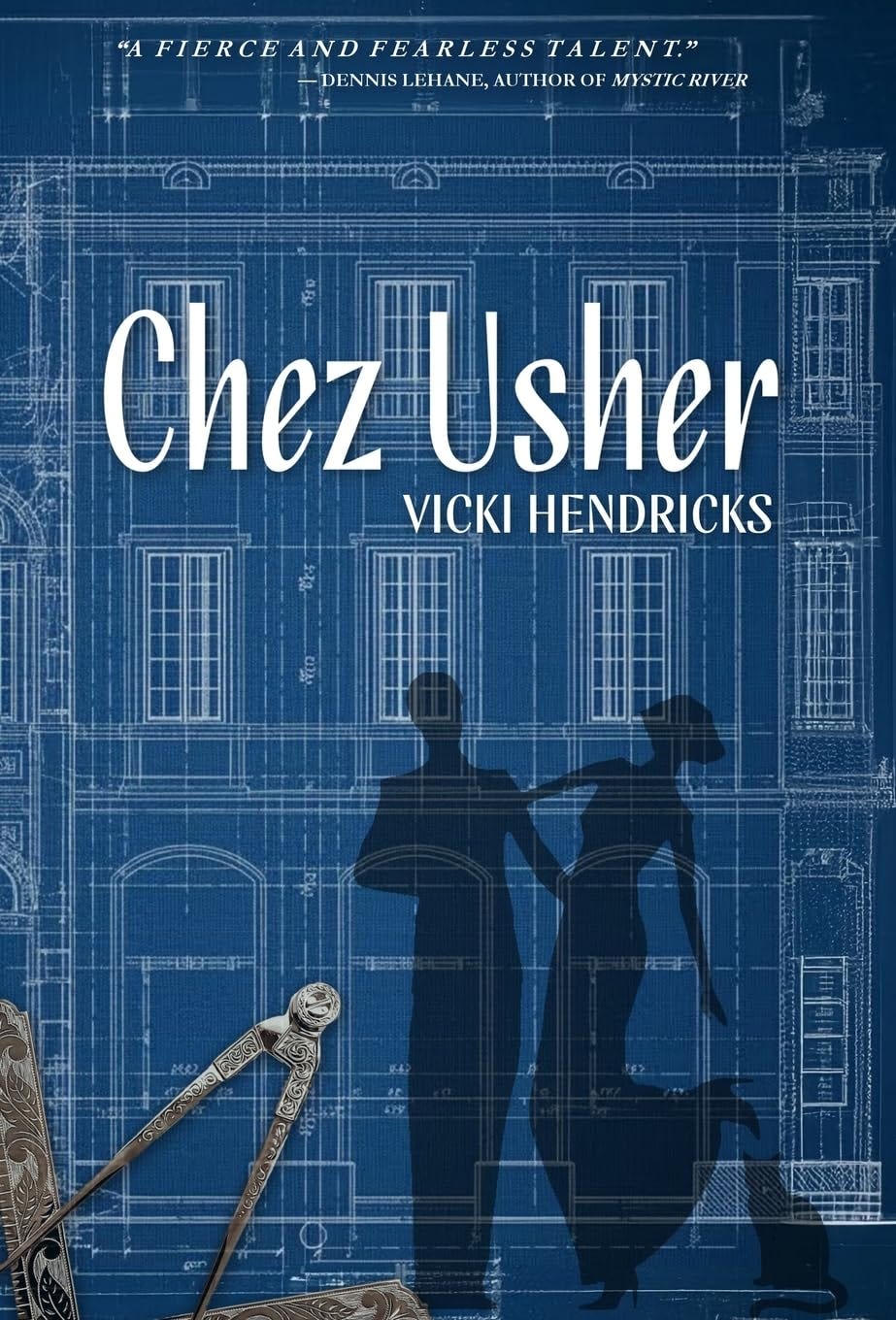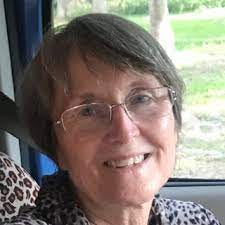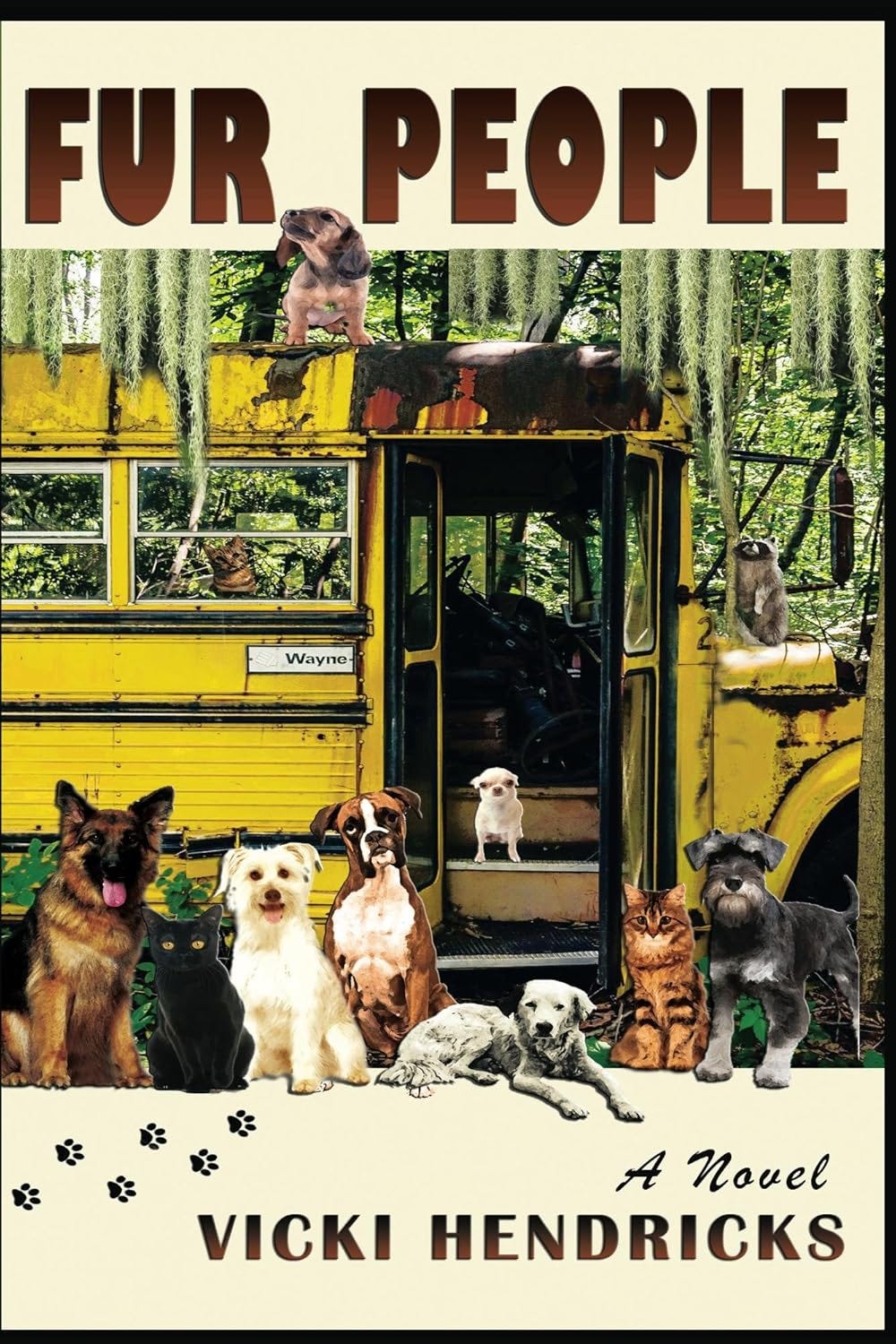An Interview with Vicki Hendricks
The legendary writer of Miami Purity is back with Chez Usher, a wild retelling of Poe's "The Fall of the House of Usher" set in Key West.
Hank was drunk and he slugged me—it wasn’t the first time—and I picked up the radio and caught him across the forehead with it. It was one of those big boom boxes with the cassette player and recorder, but I never figured it would kill him. We were sitting in front of the fan, listening to country music and sipping Jack Daniels—calling each other “Toots” like we both enjoyed—and all of a sudden the whole world changed. I didn’t feel like I had anything to do with it. I didn’t make that choice.
Thus begins Miami Purity, Vicki Hendricks’ 1996 debut, which has since become a password for aficionados of noir fiction. For those in the know, being a fan of the novel and of Hendricks’ writing is like belonging to a club. I first picked up the novel because I saw the novelist William Boyle talking about it on his Instagram. Before I’d finished it, I’d done my best to track down the rest of Hendricks’ books. I’ve since loaned out my copy of Miami Purity to a friend. I had to text to ask him to send a photo of the first page, so I could transcribe the opening paragraph here.
Each of her novels is different, and they don’t all fit neatly into the noir sub-genre. Rather, they might be read as varieties of gothic fiction, or Florida gothic, as Hendricks titled a collection of stories. She’s interested in outsiders, in life’s losers, like the hoarders collecting animals in 2013’s Fur People. For all their grotesque qualities, her characters are people we might walk past every day on the street.
Sex and violence are throughlines, as are gender and power. Hendricks’ erotic stories often turn on the ways in which women turn the tables on men, coming to swift, shocking conclusions. But her books don’t absolve anyone. Often as not, the women in her novels make bad choices, falling for the wrong men. Imagine Jean Rhys if her characters were living in a van in Florida.
Hendricks’ latest novel is a new direction for the writer, a retelling of Poe’s “The Fall of the House of Usher,” Chez Usher. The action is transposed to Florida, and the story follows August, an architect who gets sucked into helping former lover Roderick and his sister Madeline remodel their house, which is cursed and—as we discover—trying to kill them.
Tom Andes: This novel has the same dark humor and affection for outsiders I admire in your other books, but it’s a different milieu and a different kind of novel for you. What made you want to retell Poe’s “The Fall of the House of Usher”?
Vicki Hendricks: Weirdly, it’s the symmetry in the structure of the story that first obsessed me, enough to start a whole novel based on Poe’s few pages. Briefly, the story folds in half at the poem, between the building up and the breaking down. The story is filled with mirror images so that it is mirrors within a mirror. The house is reflected in the tarn, the house reflects the man, Roderick is reflected by his twin Madeline, and in the climax, he collapses against the walking-dead Madeline, just before the house crumbles into its own image in the lake.
For me, the story connects with the mystery of Poe, the man. How impossible it would have been for him to create such lovely symmetry if he were an alcoholic or a drug addict as many claimed. My novel is an unworthy homage. But Poe’s spirit, no doubt, had a hand in luring me to do it! He hasn’t been forgotten, but he has been underestimated. Poe’s ability to instill the supernatural mood in “Usher” transcends any special effects that the film industry has provided or ever will. The films are embarrassments, over the years robbing him in the eyes of the general public of his true level of creative genius. He was the inventor of detective fiction and horror fiction genres, and is considered one of the fathers of the short story.
Poe’s ironic sense of humor is often missed, but as I wrote the novel, I felt it seeping into the scenes, the doom of life made livable through humor. Poe was not gay, and I’m not trying to interpret anything beyond boyhood friendship in the relationship in his original story, or anything sexual between the twins, but the extrapolation of sexual love grew naturally to create passionate triangles and allow possible explanations for the destruction of the house, due to the primordial isolation in the family.
TA: Reading about your incarnations of Roderick and Madeline, I kept thinking of Jeffrey Epstein. They have that same depravity, the same sense of money and power warping their humanity, so they can buy anything—or anyone. How do you feel about them as characters, and what do you feel the story has to say about a society that has as many power imbalances as ours?
VH: I’m sorry to hear that the Ushers might be interpreted to have personality traits in common with Epstein. I love them! They were born in my head, my children. I didn’t mean to say anything about our society, or make Roderick and Madeline a metaphor for wealthy, evil people. They’re sad cases. I barely believe in evil, and I can’t understand the motives behind Jeffery Epstein and his followers. Of course, fiction (and maybe life) would be totally boring without power imbalances. But Roderick and Madeline are not depraved. Their desires cross normal boundaries, but they both have consciences and regrets. Yes, they are warped by their inability to exist without wealth, and it affects their honesty as they try to sustain their lifestyle. August, the outsider, in contrast, doesn’t know how to handle wealth, but he is willing to give up his honest principles to get it. A nice balance, isn’t it?
TA: You describe some of your fiction as being erotic, but it reads like no erotica I’ve ever encountered. It feels alive, dangerous, and never resorts to cliché. Likewise, your noir fiction often has a dangerous, erotic undercurrent. This book is no exception. Can you talk about how you write erotic content without falling into the kind of cliché that would make it for lack of a better word porn-y?
VH: I’d like to repeat that—alive, dangerous, without cliché! Those are words that would make me buy a book! My highest goal is to be unique. I don’t want to write anything like anything else I’ve written or anybody else has. The sheer volume of fiction that exists now threatens destruction of creativity by accidental imitation, and I’m driven to avoid that.
The graphic sex is woven into character, not just titillating, but purposeful detail, and that’s what makes it original. In Chez Usher an outrageous sex scene even provides a plot point. I think my writing has been called eroticism, a more polite term than porn, not to lighten the impact expected of the content, but to discourage disrespect. However, my fiction has also been called porn and banned by libraries, schools, etc, in the 90s, but if people read it and say porn with their lips curled at the corners into a little smile, I’m happy. The Brits have been unapologetic fans of the lurid and perverted throughout my career.
I should mention that sex has led me to areas of uniqueness that I couldn’t find otherwise. After several novels and stories, male/female sex started to sound repetitive, and I had to move on to other combinations, even including bestiality at times. When it flows, I go with it. Originality is god. I’ve probably made some publication sacrifices for it, but not enough to matter. It’s been fun, and that’s what fiction is made for.
TA: Can you talk about the distinction for you between your noir and your erotic fiction? Do you set out to write in a particular genre or subgenre, or you discover that as you write the story or novel?
VH: Noir, by definition, should include murder. I’ve stretched mine into manslaughter, suicide, killing animals (not really a stretch), and now possible supernatural homicide. But to me, noir is mostly in character, a person, psychologically impaired in some way, who has made poor choices, and makes worse choices trying to regroup, finally spiraling into a more or less degree of personal hell. Murder is a good ride to propel someone downward, and obsession of any kind can set that up. To me, sexual obsession and resulting passion make the only believable motive for murder. I have used greed as a motive in order to get things moving quickly, if there’s a word count. It’s a fast way to supply motive for most people, but I don’t believe it myself.
Sometimes, when asked for an erotic short story, I’m told that I don’t have to hold back. It encourages me to go farther with whatever comes into my perverted brain, I guess, but I have no reliable gauge on what’s shocking until I hear about it. After all these years, I have an inkling, but no flashing lights go off.
TA: How important is setting to you in this story? I think of your books as being quintessentially Floridian, capturing so much of what is both magical and marginal about the place. Was it different for you to examine Florida through the lens in this book?
VH: The setting is so important here since the mansion might be considered a character in his own right. Chez Usher is quintessential Key West, yes, “magical and marginal,” my beloved town. I used it almost thirty years ago in Voluntary Madness, and its basic nature hasn’t changed. A reviewer once said that I had the mind of a gay man. It didn’t quite make sense to me, but I felt it was a nice compliment, although not meant as such, stated as fact, regarding a particular character’s view point. I took the chance to try it out in Chez Usher. I loved examining Key West through a gay lens. I’d observed it for many years.
My default has been to write about noir characters on low education and economic levels, since desperation is a great motivator, and the character August is built on that. My family was middle class when I grew up, but would probably be lower middle class by today’s standards. Usually, I took the easy path and exaggerated downward. But the Internet is the great equalizer. It provided Madeline’s taste in single malt scotches and the detailed workday of an architect. Film conjured up the Usher lifestyle and Key West gave me the ground level facts under the fancy. However, I admit, Roderick’s costume was unadulterated memory from my first outrageous Fantasy Fest.
TA: Your debut, Miami Purity, came out nearly three decades ago. Can you talk about how publishing has changed and how you made your way to a great indie publisher like Fahrenheit Press?
VH: Such a change, and I can’t say I like it! For me, it came about through electronic books and social media. The internet barely got started in publishing before my fourth book Sky Blues, in 2002, and I knew nothing about it, except to have someone build a website for me. People had begun creating their own book tours, and I had no idea or inclination to do it myself. I failed to promote Sky Blues for St. Martin’s not even aware that I had shirked my job. For my first three novels, I had publicists who got bookstore commitments and newspaper reviews, people who arranged all the travel, and everything was paid for. In 2002, I had a publicist at St. Martin’s, but they didn’t set up anything. I thought it was because my novel was not on their list of major books for the year. That was likely true, but I was teaching full time and barely noticed what was going on until Cruel Poetry. I still don’t have the energy or the ability to do it right, and I doubt I ever will.
I had admired Fahrenheit Press’s quality books for several years when A. Neil Smith, an old friend, one of their novelists, told me to disregard the line in the submissions section on the website that says not to send a novel if it isn’t noir. I thought it was foolish, but I sent it anyway, and I was so wrong! It was a brilliant move. Chez Usher is gothic noir, apparently, and the publisher, Chris McVeigh, loves it. This isn’t the first time I’ve made that mistake. I didn’t know Miami Purity was noir until my Pantheon editor Sonny Mehta told me. And I’d modeled it after The Postman Always Rings Twice. Duh.







